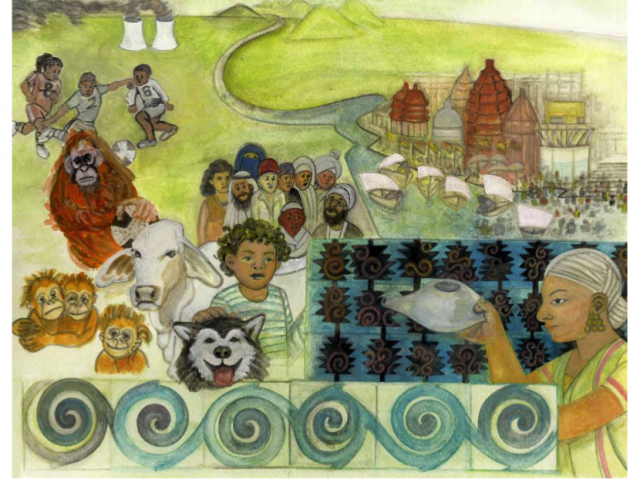Cara Judea Alhadeff reminds us that social and environmental justice are inseparable and asks us to “consider the links between many of the popular brands of chocolate and child slavery” when buying Halloween candy this year.
Articles
Esther Was Vegan Too: On Purim, Let’s Renew Our Struggle to End Factory Farming
|
From saving water, to helping animals, to decreasing our carbon footprint, the single most effective change we can make is to eat a more plant-based diet. Just as Esther took action to save the Jews, so we can take action to save animals and our planet from extermination.
2015
Embracing the Radical Economics of the Bible
|
The spirit of the Jubilee laws is clear and relevant: to prevent the emergence of a permanently impoverished underclass.
2015
Sabbatical Year and Jubilee in Twenty-First-Century America
|
A campaign to reinstitute the Sabbatical Year and Jubilee in industrial societies could fundamentally transform the global capitalist system.
Editorials & Actions
The GMO Deception!
|
Editor’s note: The following is a note from the radio and tv show Democracy Now
As voters in Oregon and Colorado head to the polls next week to decide if they support labeling laws for genetically modified organisms, on Tuesday we will be joined by Sheldon Krimsky to discuss his new book, The GMO Deception: What You Need to Know about the Food, Corporations, and Government Agencies Putting Our Families and Our Environment at Risk. The book has a forward by Ralph Nader and is a compilation of thought-provoking essays by leading scientists, science writers and public health advocates who, in their writing, explore the social, environmental and moral consequences of GMOs. You can read the introduction below. Sheldon Krimsky is professor of urban and environmental policy and planning at Tufts University as well as an adjunct professor in the Department of Public Health and Family Medicine at the Tufts School of Medicine. Krimsky is also a board member of the Council for Responsible Genetics.
2012
Finding Manna in the Age of Monsanto
|
I believe that ancient biblical wisdom can empower us to take on the high-tech and politically sophisticated iniquities of the Monsantos of the world. One story, in particular, offers a profound vision of economic and ecological justice: the famous account in Exodus 16 of God feeding the hungry, grumbling, newly liberated but still fearful Hebrews who were wandering in the desert.
Articles
Obama’s Deregulation of GMO Crops
|
Early this spring, while the world was distracted by Egypt’s uprising, President Barack Obama pushed the Secretary of Agriculture and the U.S. Department of Agriculture to deregulate genetically engineered alfalfa and sugar beets in the United States. The USDA came through as he directed, totally deregulating these Monsanto-patented genes in early February.
Food/Hunger
Reclaiming the Sacred in Food and Farming
|
Farming is fundamentally biological. The essence of agriculture begins with conversion of solar energy through the living process of photosynthesis. The food that sustains our lives comes from other living things. If life is sacred, then food and farming must be sacred as well. Throughout nearly all of human history, both food and farming were considered sacred.
2011
Tikkun of the Fertile Soil
|
As a result of our current practices of industrialized agriculture, food chains and ecosystems are collapsing and extinction rates are soaring; human food systems — involving food production, processing, transport, and distribution — are strained, fragile, or broken; and hunger is again on the rise.
2011
Fighting to Prevent Global Hunger
|
Despite its obscurity as a federal government regulatory body, the Commodity Futures Trading Commission (CFTC) is making decisions now that could determine whether hundreds of millions of people experience malnutrition, hunger, and perhaps even starvation in the coming years.
2011
A New Future for Food
|
Many happily munch on their hamburgers without a thought to the land destroyed for cattle grazing, or the immense cruelty in the raising and slaughter of the billions of animals we use for food each year. Mothers continue to prod their youngsters to eat their vegetables, unaware of the poisons involved in their production, not to mention the water and air.
2010
The Race to Save Civilization
|
If we look at early civilizations that declined and collapsed, more often than not it was a shortage of food that brought them down. Until recently I had rejected the idea that food could be the weak link in our modern civilization; I now think it probably is.
2009
Conversation on Vegetarianism
|
An exchange between Tikkun reader Ruth Eisenbud and Michael Lerner, in response to Daniel Brook’s article “The Planet-Saving Mitzvah: Why Jews Should Consider Vegetarianism” in the July/August 2009 issue of Tikkun. magazine.

